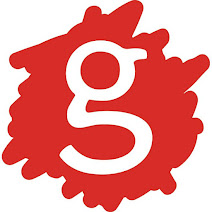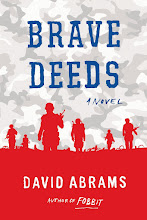Thursday, January 7, 2016
Elizabeth Marro’s Library: Every Book Has a Story
Reader: Elizabeth Marro
Location: San Diego, CA
Collection Size: Between 500 and 600.
The one book I'd run back into a burning building to rescue: Sorry, I can’t pick just one. But now that you’ve got me worried, my picks will be grouped together on a shelf near the door along with a fireproof satchel big enough for all 21 novels in Patrick O’Brian’s Aubrey-Maturin series, Volumes I through III of the Dictionary of American Regional English, AND a very beat-up 1936 edition of Gone with the Wind. While each is replaceable, they are from or linked directly to a person I love. The stories and those connections will comfort me when my home is in ashes.
Favorite book from childhood: Johnny Tremain by Esther Hoskins Forbes. My copy is gone now, dropped too many times in the bathtub when I was growing up, but I read it so many times I can conjure scenes from memory. It was the first book that treated me like an adult.
Guilty pleasure book: I never feel guilty about reading any book. I do feel an almost sinful pleasure when I escape into the calli of Venice with Donna Leon’s Commissario Guido Brunetti. They are not so much mysteries as an excuse for Leon to describe the relentless assault on the “beautiful and civilized” life of Venetians. In the process we are treated to elaborate descriptions of food, wine, walks, and the fading beauty as well as the resilience of the city.
The central library in my home are the shelves that wrap around our bed and spill onto the additional shelves we’ve stashed along the walls of the room. There are branch libraries in my office, the bathroom, the guest room, the car and in a bag that holds books I want near me just in case. A growing number of books populate my Kindle and iBooks libraries.
I do have an issue right now with organization which is to say, I don’t have any. Jorge Luis Borges’s Collected Fictions are separated from Cortazar’s Cronopios and Famas by several novels by Cormac McCarthy who can also be found across my room on another shelf. Early Richard Ford shares space with the The Well Dog Book and later Richard Ford can be found squeezed between Jane Austen and Amy Tan and not far from a book called Super Brain. It wasn’t always thus but thanks to a massive “decluttering” campaign in advance of a move we never made, a huge number of our books were stashed under our bed for a long time. When I retrieved them I behaved like a woman in a fever, ripping open bags and stashing on the shelves as the came out of the bags. I was just happy to see them once again.
There is something to be said, though, for the random shelving of books. The hunt for Jane Smiley’s 13 Ways of Looking at the Novel uncovers the long-lost edition of Carol Shields’ Collected Stories. I discovered Le Carre’s The Tailor of Panama, Atwood’s The Blind Assassin, Ann Patchett’s Bel Canto, Anne Tyler’s Noah’s Compass, and Barbara Kingsolver’s Flight Behavior clustered together and I recalled how I’d grabbed each of them once to just to study their opening pages. Each offers a different version of the perfect way to start.
The books I have are linked to periods of my life, projects I’m working on, and the crushes that follow when I discover or rediscover writing I love. The ones that I hold closest to my heart are linked to the people who brought them into my life.
My father, who taught me to read at the age of four and then left big adult books around for me to tackle, turned me on to the Patrick O’Brian’s series about twenty years ago. I knew why he loved them—he went to sea when he was seventeen and has never gotten over it. I love the ocean but cannot conceive of a life on it—or even contemplate a ferry ride without reaching for motion-sickness patches. I went to sea, though, with Aubrey and Maturin many many times, and each time, my father was with me or waiting for me to emerge so we could chat about the latest adventures. I cannot look at the books on my shelf without hearing my father’s delighted laugh or remembering the time we took a family walk, so deep in discussion of how the final novel might have ended had O’Brian lived to complete it, that my sister stopped us and said, “Who the hell is Jack?”
My husband gave me the first three volumes of the Dictionary of American Regional English. Each birthday or Christmas holds the promise of another volume. I can open any page and find something to delight me. The “lopsy lows,” a term uncovered in New Jersey around 1968 for example are joking names for imaginary diseases while “lopsy-wise” is something folks in New Hampshire and Maine used to say around 1900 to describe something askew, or a lopsided manner. The other day, I opened up the third volume to a random page and found the term “jimberjawed.” I’m not sure how but I will find a way to use that word.
My husband knew that these books would delight me. He has mixed success when it comes to picking out other kinds of gifts but he never fails when it comes to books. Our early dates often wound up with us walking the aisles of a bookstore. He would find something and bring it to me and it would be perfect. We would sit for hours with stacks of books, deciding which ones to buy. When I once shared this with my aunt, she asked, “Would you rather have a man who knows your dress size or a man who knows your mind?” The answer was obvious. I don’t wear dresses much anyway.
Then there is my copy of Gone With The Wind owned first by Anne M. Wild of Rochester, New York whose family owned the old New Hampshire house our family moved into in 1966. The house was empty of people but bookcases all over the downstairs were filled with leather-bound volumes of Dickens and Shakespeare and a single copy of Gone With the Wind. When I was fourteen and driving my mother crazy with my moods, my boredom, and my insecurities, she grabbed it off the shelf and told me to read it. If nothing else, it would give her a few days of peace.
I began to read. And read. And read. I sat in the back of algebra class, the text book propped up on my desk, GWTW hidden below on my lap. I remember finishing it late one spring afternoon, almost suppertime. I wandered to the kitchen in a fog and sat down at the table while my mother stood at the stove making dinner. It was just the two of us, a rare moment on a busy school night in our large, chaotic household.
“You finished,” she said.
“Yes.” I could barely speak I was still so full of the story.
She came over a put a hand on my shoulder and squeezed. “Just sit a minute.”
Although there is much I have come to question about GWTW, and my view of what the story is about has dramatically changed since I was fourteen, I’ve never forgotten the desolation I felt when I finished the final page. I’ve never forgotten that moment of silent, shared understanding with my mother. I’ve never forgotten that she let me sit there as long as I needed to even though it was my turn to set the table.
These small stories live on my shelves along with the books. Perhaps organizing them makes sense. Perhaps, in the end, it only matters that they are there.
Elizabeth Marro is the author of the debut novel, Casualties. Her work has appeared in The San Diego Reader, The Gloucester Daily Times, LiteraryMama.com, and elsewhere. A long-time resident of the “North Country” region of New Hampshire, she holds degrees from the University of New Hampshire and Rutgers University, and now lives in San Diego. Read more about her at her website.
My Library is an intimate look at personal book collections. Readers are encouraged to send high-resolution photos of their home libraries or bookshelves, along with a description of particular shelving challenges, quirks in sorting (alphabetically? by color?), number of books in the collection, and particular titles which are in the To-Be-Read pile. Email thequiveringpen@gmail.com for more information.
Labels:
Cormac McCarthy,
Margaret Atwood,
My Library,
Richard Ford
Subscribe to:
Post Comments (Atom)



















What a wonderful view into your world of books and literature. I had much the same experience reading GWTW at the same age, and since I grew up in Atlanta, it had so much resonance. And I agree with what you said about how uncomfortable a novel it is today --
ReplyDeleteThis is just splendid. GWTW was huge for me, too. Read it so many times I could open it at random and know exactly where I was. I long for the kind of sustained, breathless reading I did so often as a young person. Wish it for my own kids. Can't wait to read your book, dear Betsy.
ReplyDeleteCongratulations on the upcoming novel. Loved hearing about some of the books that made an impact on you and that are floating around your shelves. Johnny Tremain was a big one for me as well. Cormac McCarthy later. And, of course, the Aubrey-Maturin novels, all of which I have read several times, sharing the experience with my wife, Jessica, and many others. It's wonderful to see both of my books A Sea of Words and Patrick O'Brian: A Life Revealed on your shelf along with O'Brian's great novel series. I also have a strong connection with books and my mother, who always took me to the library when I was young and who later steered me to such books as Giuseppe di Lampedusa's The Leopard and Robert Ruark's Something of Value. Recently I was traveling in Ecuador with my oldest daughter, Hazel, and discovered a copy of the latter on a shelf in an inn. Recommending it to Hazel, it was wonderful to serve as a conduit, connecting my mother, who is no longer alive, with my daughter through a book that meant a lot to me.
ReplyDelete